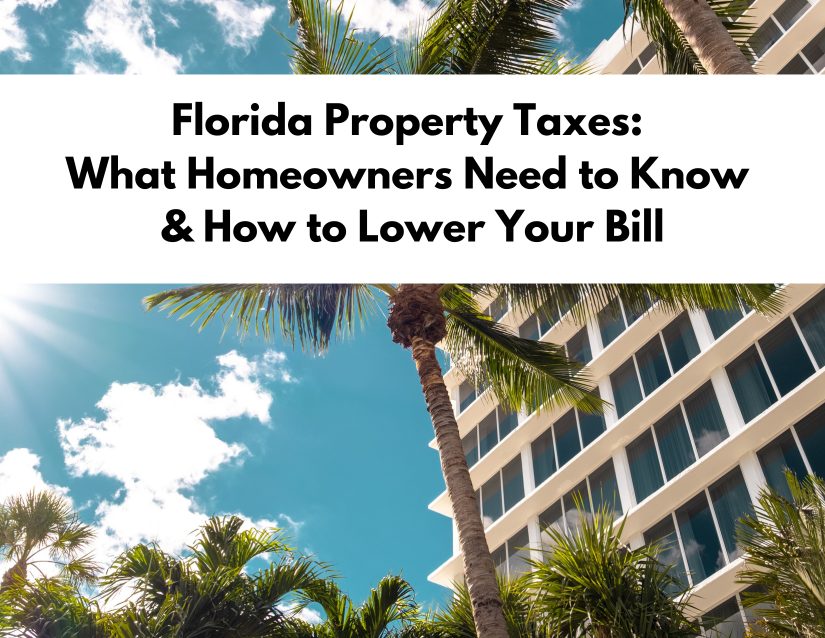
Understanding Florida Property Taxes
If you own a home in Florida or are considering buying one, understanding Florida property taxes is crucial. Property taxes are one of the biggest expenses for homeowners, but with the right knowledge, you can plan ahead and even lower your tax bill. This guide will explain how Florida property taxes are calculated, what exemptions can reduce your costs, and how often properties are reassessed. Plus, I’ll share expert strategies to help you keep more money in your pocket.
Florida is one of the few states without a state income tax, so property taxes play a major role in funding essential services like schools, roads, police, and fire departments. While every homeowner in Florida must pay property taxes, the good news is that the state offers several exemptions that can lower your costs significantly.
How Are Florida Property Taxes Calculated?
Florida property taxes are based on the assessed value of your home, which is determined annually by the county property appraiser. This value is then multiplied by the millage rate, which is set by local governments. A millage rate represents the tax amount per $1,000 of a property’s assessed value.
For example, if your home is assessed at $400,000 and the millage rate in your area is 20 mills (or 2%), your annual property tax bill before exemptions would be $8,000. Your final bill will depend on any exemptions you qualify for, which I’ll discuss next. You can learn more about how property taxes are calculated in this Consumer Guide to Property Taxes from the National Association of Realtors (NAR).
Florida Property Tax Exemptions That Can Lower Your Bill
One of the best ways to lower your property tax bill is to take advantage of exemptions. Florida offers several property tax exemptions that reduce the taxable value of your home:
Homestead Exemption – If you live in your home as your primary residence, you can qualify for a $50,000 exemption. Additionally, the Save Our Homes cap limits the annual increase of your assessed value to 3% or less (Florida Department of Revenue).
Senior Citizen Exemption – Homeowners 65 years or older with limited income may qualify for extra tax reductions.
Veterans & First Responders Exemptions – Military veterans, first responders, and individuals with disabilities may receive additional tax relief.
Widow/Widower Exemption – Surviving spouses can qualify for a small reduction in taxable value.
These exemptions can save you thousands of dollars over time. To apply, visit your county property appraiser’s website or check out this Florida Property Tax Guide for more details.
How Often Are Florida Properties Reassessed?
In Florida, properties are reassessed every year based on the market value as of January 1st. County property appraisers consider recent home sales, new construction, and market trends to determine assessed values.
If home values increase, your assessed value may go up, leading to higher property taxes. However, the Save Our Homes cap protects homeowners with Homestead Exemption, limiting the increase to 3% per year or the inflation rate, whichever is lower. This helps homeowners avoid major tax hikes even if property values rise quickly.
If you recently purchased a home, keep in mind that the assessed value resets to the current market value. This means new homeowners often see a higher tax bill than the previous owner. To avoid surprises, always review the estimated property taxes before closing.
Why Do We Pay Property Taxes in Florida?
Since Florida has no state income tax, property taxes are essential for funding public services such as:
Public Schools – A major portion of property tax revenue supports education.
Police, Fire, and Emergency Services – First responders and public safety programs depend on property taxes.
Roads and Infrastructure – Local governments maintain roads, bridges, and public utilities with tax revenue.
Libraries and Community Programs – Many essential community services are funded by property taxes.
Every Florida homeowner contributes to these services through property taxes, which help maintain strong communities and quality public resources.
Expert Tips to Lower Your Florida Property Tax Bill
Want to reduce your property tax burden? Here are some effective strategies:
Apply for All Eligible Exemptions – Homestead and other exemptions can save you thousands every year.
Check Your Property Assessment – If you believe your assessed value is too high, you can appeal the assessment through your county property appraiser’s office.
Avoid Over-Improving Your Home – Major renovations can increase your property’s assessed value and raise your taxes.
Use Portability Benefits – If you move within Florida, you can transfer your Save Our Homes cap to your new home for continued tax savings.
Research Tax Rates Before Buying – Some counties have lower millage rates, so researching before purchasing can help you save money in the long run.
Florida property taxes can seem overwhelming, but understanding how they work can help you plan, budget, and even lower your tax bill. Knowing how taxes are calculated, what exemptions you qualify for, and how often reassessments happen ensures you make smart financial decisions.
If you’re buying or selling a home in Florida and want expert guidance on property taxes, home values, or the Miami real estate market, let’s connect! Contact me at 786.355.7395 for professional real estate advice.

 Facebook
Facebook
 X
X
 Pinterest
Pinterest
 Copy Link
Copy Link

